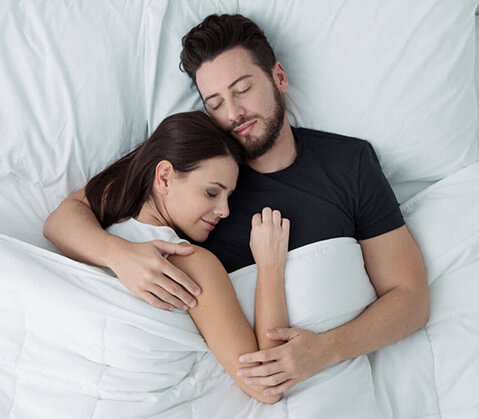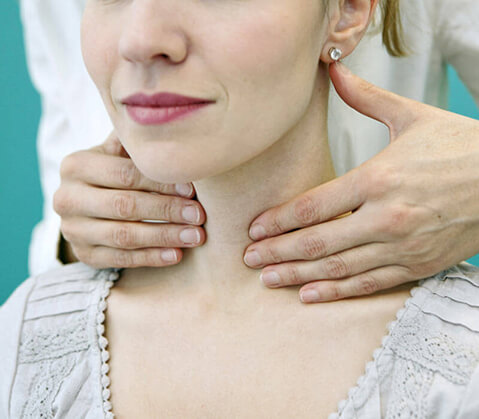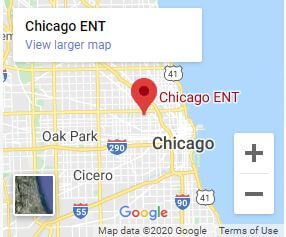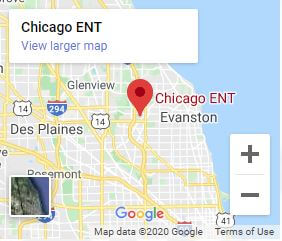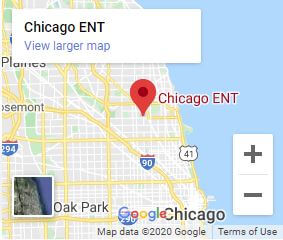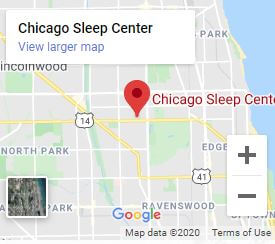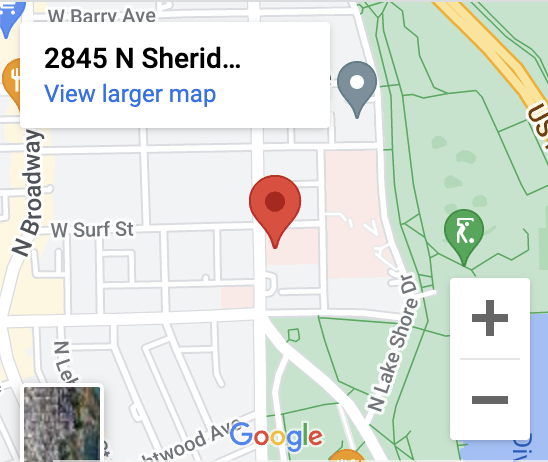The warmer weather in spring comes with allergens. As allergies begin to flare up, it’s essential to know the difference between allergies and COVID-19.
While the symptoms of COVID-19 and allergies can appear quite similar and even have several overlapping symptoms, some are rarer than others.
It’s not unusual with the ongoing pandemic to feel a bit anxious at the first sign of a sniffle.
So, how can you tell the difference between the two? Keep reading to find out!
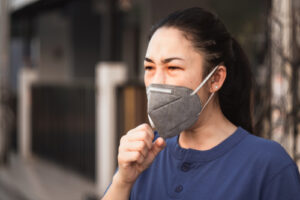
COVID-19 and Allergy Symptoms
Some of the symptoms of COVID-19 include the following:
- Rashes
- Loss of smell and taste
- Fever
- Cough
- Sore throat
- Headaches
- Fatigue
- Shortness of breath
Allergy symptoms often include:
- Runny nose
- Sneezing
- Itchy and watery eyes
- Nasal congestion
Congestion due to allergies can cause headaches, and you may have a sore throat due to a post-nasal drip. Also, itchiness in the eyes and nose is typically synonymous with allergies and not COVID-19. For people that suffer from seasonal allergies, these symptoms tend to last for several months at a time and may require the use of medication to keep them in check.
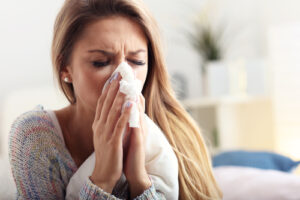
Allergy Symptoms that Overlap with COVID Symptoms
Some of the possible allergy symptoms that overlap with COVID symptoms are sore throat, a runny nose, headaches, nasal congestion, and wheezing. If you have shortness of breath, loss of smell, or a dry cough, you might have contracted the virus, but it might also be a result of the side effects of having allergies.
The Difference Between COVID-19 and Allergies
COVID-19 is an acute condition, meaning that it’s severe and sudden. Patients who do have COVID-19 start exhibiting symptoms 2 to 14 days after exposure to the virus.
COVID-19 symptoms last for about 10 to 14 days. Symptoms vary from individual to individual, but they’ll manifest in most people within the two-week exposure window. This is true whether you have a severe or moderate case.
There is more stomach upset and diarrhea with COVID-19 coupled with severe shortness of breath at times. Shortness of breath and chest tightness is a symptom seen in COVID-19 that you won’t usually see with people that have seasonal allergies unless the allergies exacerbate underlying asthma. Also, a cough resulting from COVID-19 will usually be more extreme and abrupt in onset than a cough that you have due to allergies.
A new loss of your sense of taste or smell may point to COVID-19, and you should get tested. This isn’t typical of allergies.
Allergy symptoms are longer-lasting compared to viral symptoms. Another sign that doesn’t match up with COVID-19 is if you have a fever.
Although you may feel like you’re taking a beating due to your allergies, this is not a symptom associated with seasonal allergies. For people who have COVID-19, having a fever is one of the common symptoms you may develop.
Sometimes with allergies, you may develop a sinus infection that can make you feel tired, but it should not cause severe fatigue, as reported with COVID.
Seasonal Allergies are Chronic

Seasonal allergies are a chronic disease, meaning they occur annually during pollen and mold seasons. The seasonal allergies typically being in the spring and run through the fall. Symptoms can vary from mild to severe depending on the pollen and outdoor mold counts at certain time so the spring, summer, and fall.
Although seasonal allergies are most common during the spring through fall, you can certainly be allergic to things indoors, like dust or mold. If that’s the case, then these allergies can occur throughout the year. If you notice that you experience symptoms at the same time every year, you likely have an allergy.
COVID-19 Tends to Attack More of the Body than Allergies
Allergies tend to affect the ears, eyes, nose, and throat. In some cases, they can trigger asthma symptoms of shortness of breath, wheezing, chest tightness, and cough. While COVID-19 can cause similar symptoms as allergies, COVID-19 is more likely to cause systemic, body-wide symptoms, such as fever, chills, nausea, muscle and joint pain, rash, stomach pain, diarrhea, and/or lightheadedness.
Unlike COVID, quick onset of fatigue, weakness, exhaustion, aches, and pain is rare with allergies. Although allergies can cause fatigue, it’s usually very gradual and not intense, as you’d see with viral infections.
Other symptoms of allergies include facial pressure and post-nasal drip. A considerable amount of coughing is not typical with seasonal allergies, except in patients with asthma allergies or marked post-nasal drip.
The symptoms of allergies can improve with antihistamines; however, this doesn’t happen for people that have COVID-19.
How to Protect Yourself Against COVID-19
Among the best ways to prevent contracting COVID-19, according to the CDC, include:

- Cleaning your hands regularly using clean water and soap or an alcohol-based sanitizer
- Frequently disinfecting and cleaning surfaces
- Avoiding touching your face
- Staying away from people who already have COVID-19
- Wearing a clean mask when social distancing cannot be maintained. It’s important to wear a clean mask, as masks can over time collect allergens, such as pollens which can worsen breathing
Prevention Measures for Allergies
You can develop allergies at any point in your life, making it difficult to know what exactly you are dealing with. Fortunately, allergies respond positively to avoidance measures, medications, and/or allergy shots.
Talk to the allergists at Chicago ENT if you suspect you may have allergies. Our allergists are experts in diagnosing and managing allergies. If allergies are found, our allergists can recommend environmental control measures, medications, and/or allergy shots to improve your quality of life and breathing.
We use a multidisciplinary approach to treat a broad spectrum of allergic disorders. The practice’s effective treatments for allergies call on the best medicine, which entails a highly individualized, evidence-based, and holistic treatment plan that addresses each patient’s unique needs.
Accurate Diagnosis
The only sure way to know whether you’re suffering from allergies or have coronavirus is through testing and assessment. When it comes to allergies, asthma, and all your ENT needs, schedule an appointment at Chicago ENT today!


